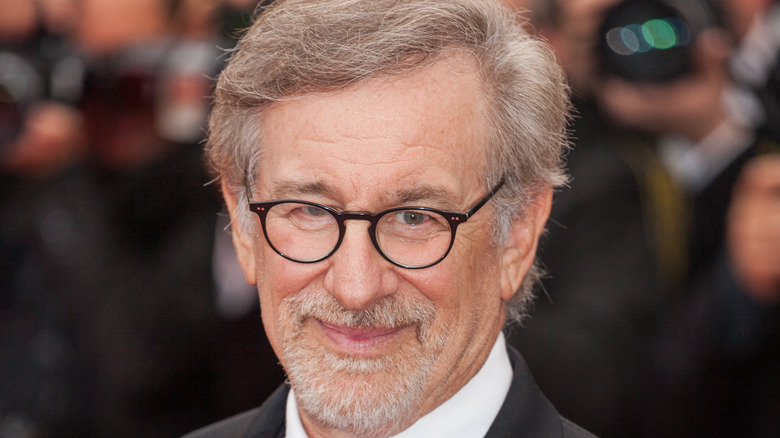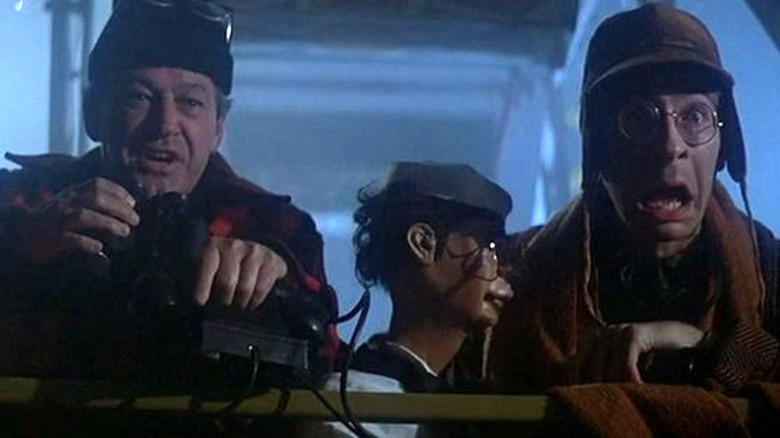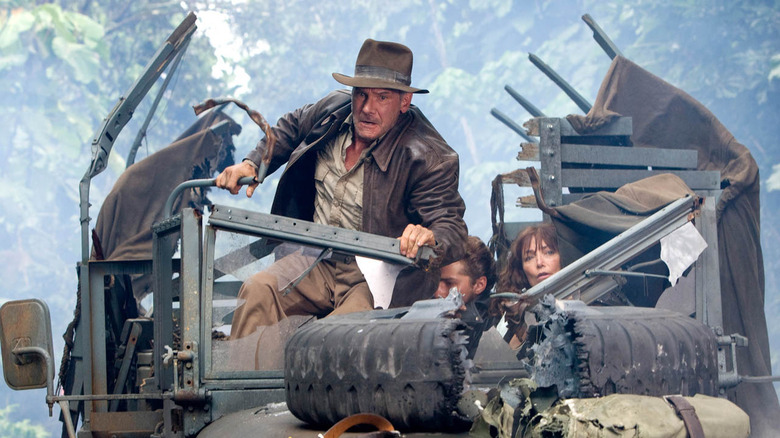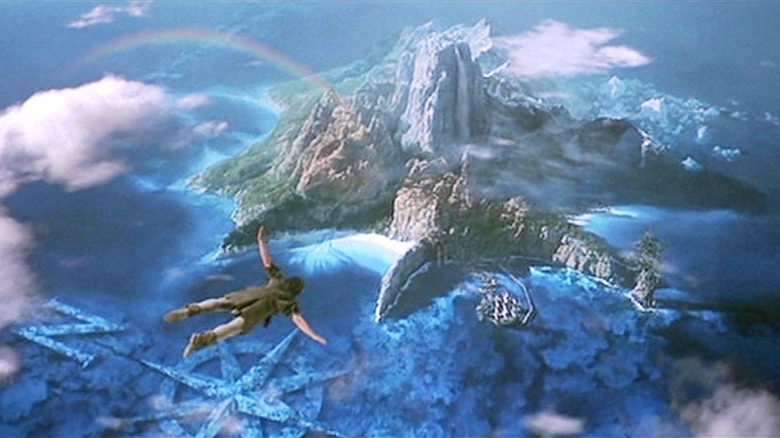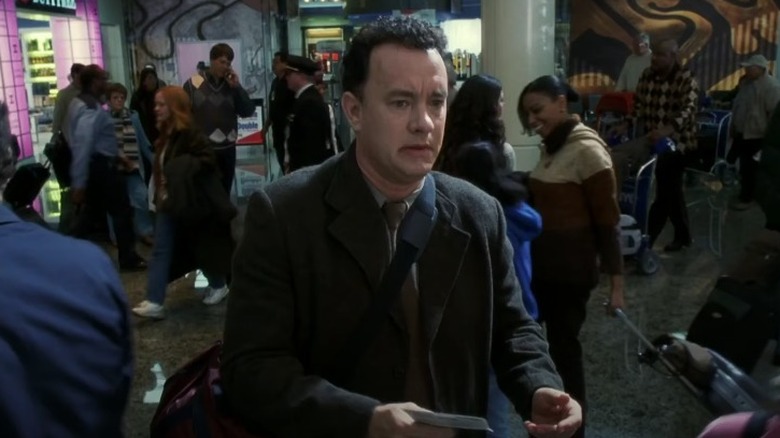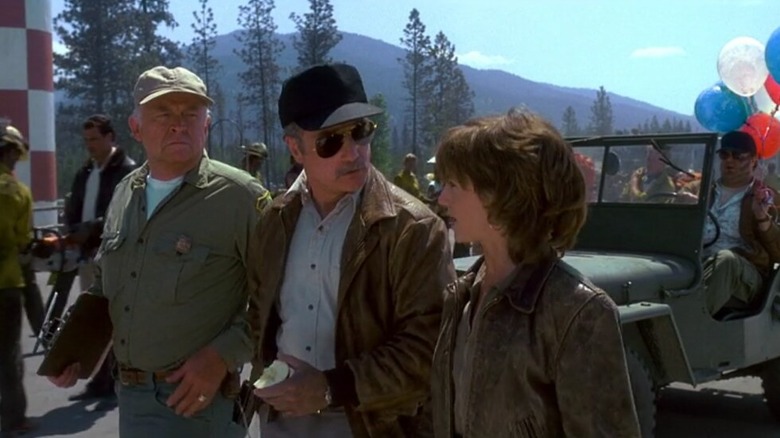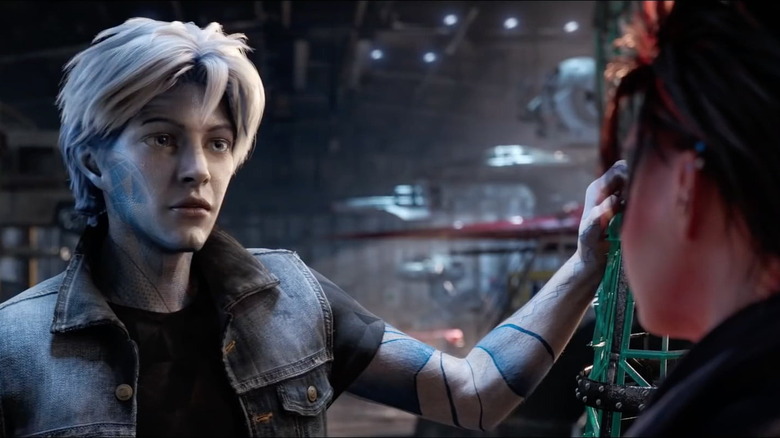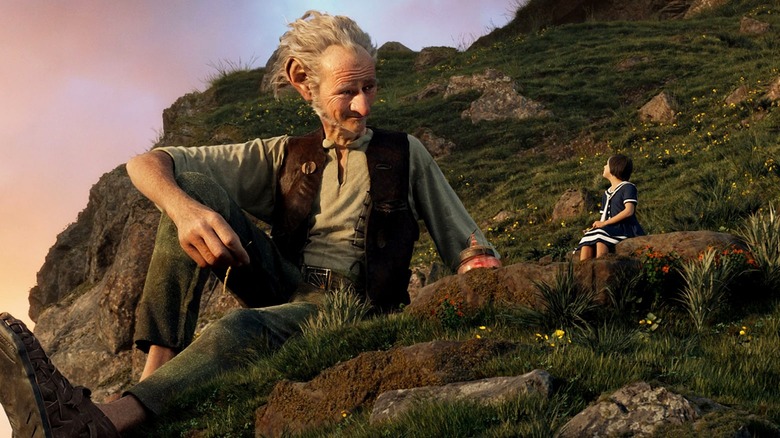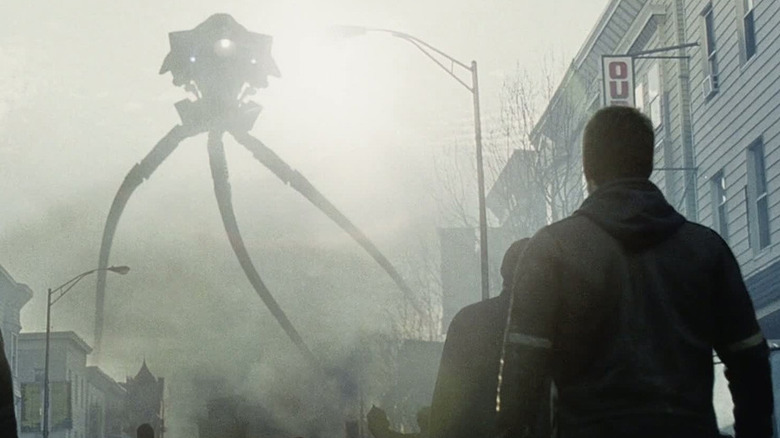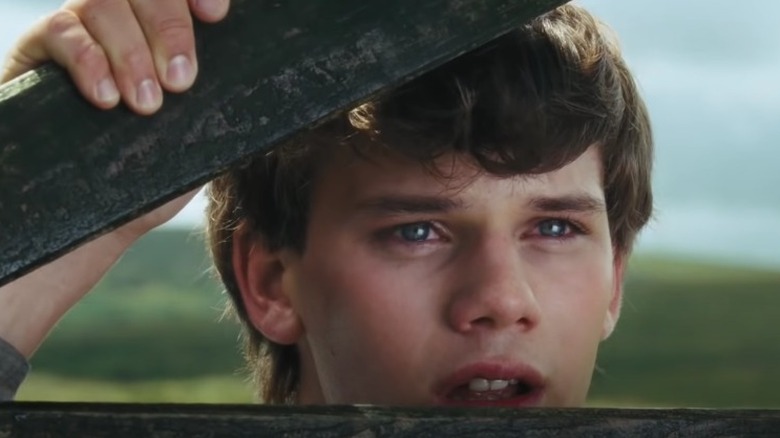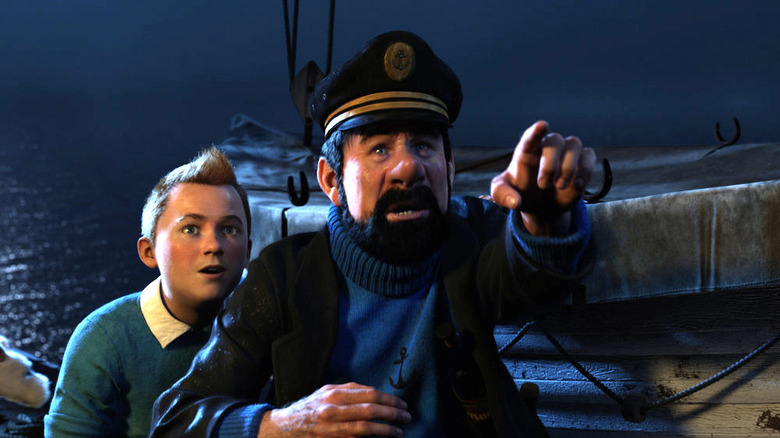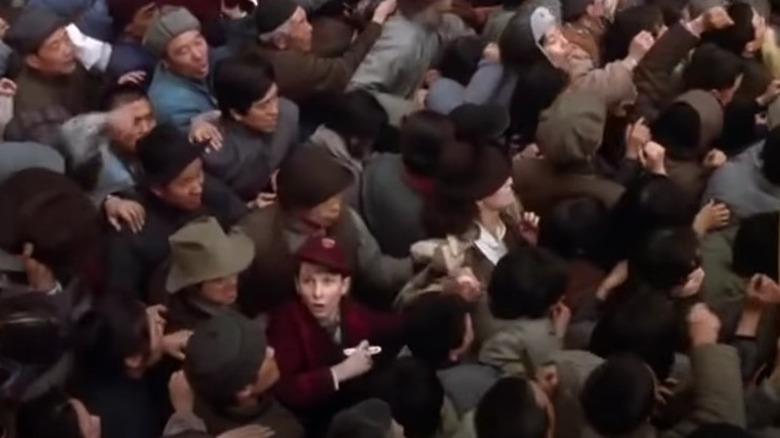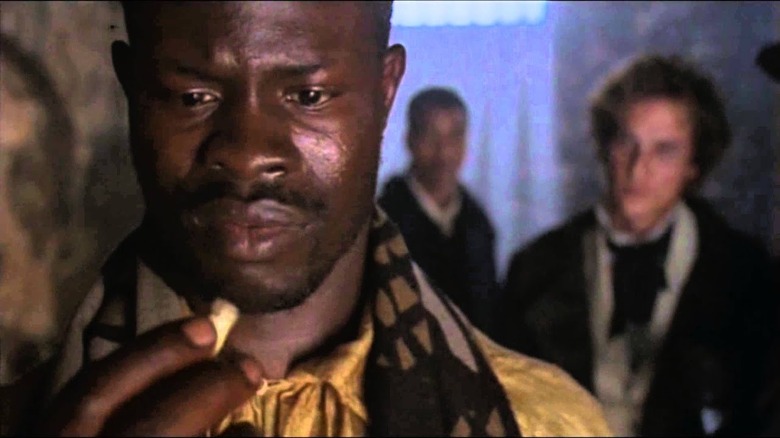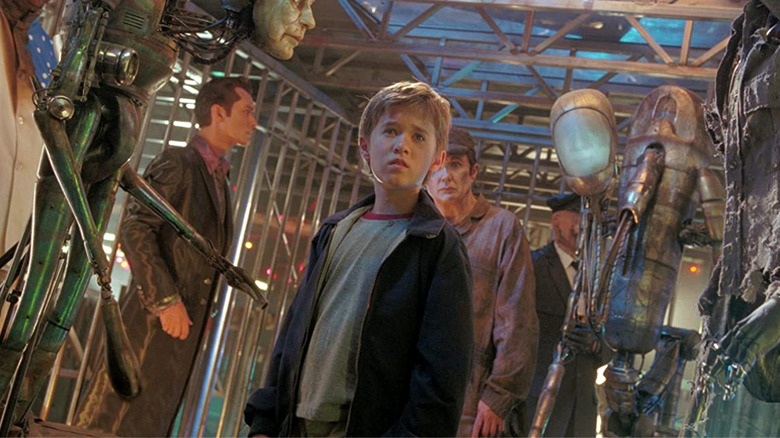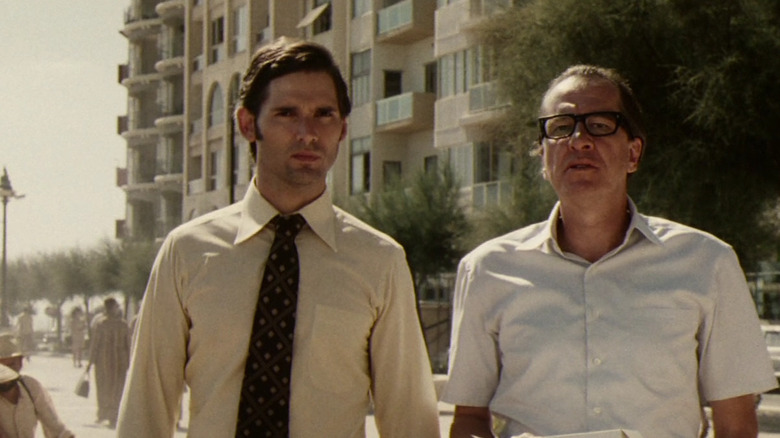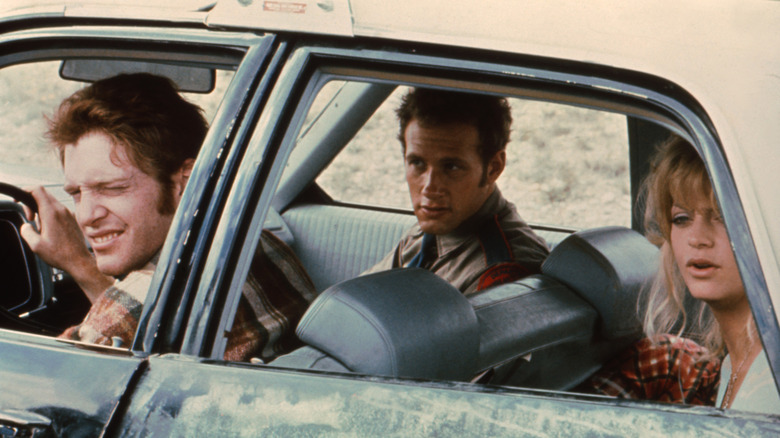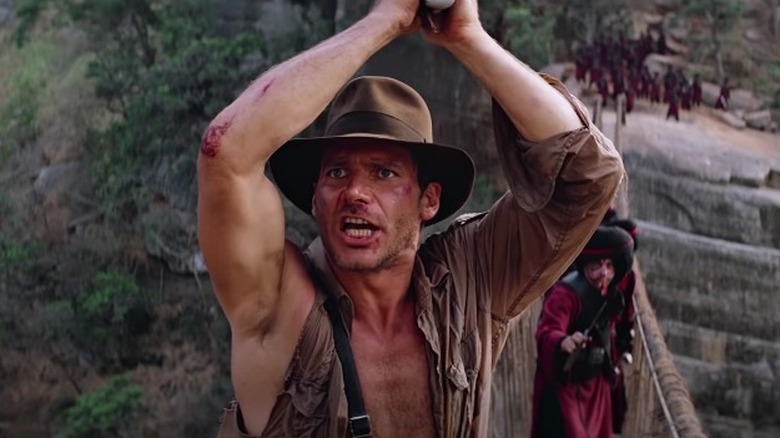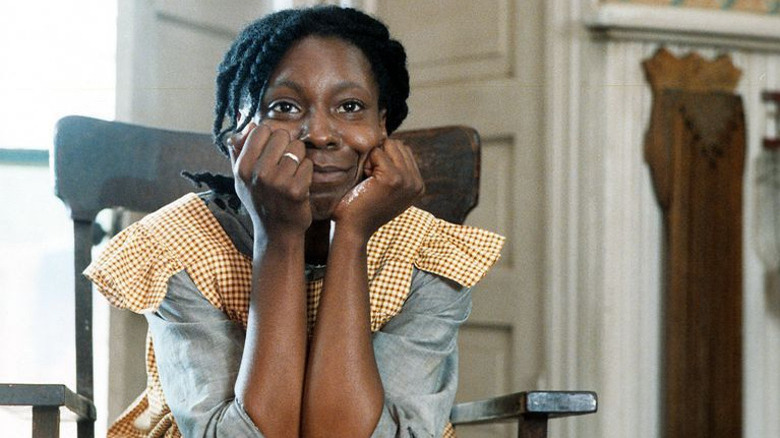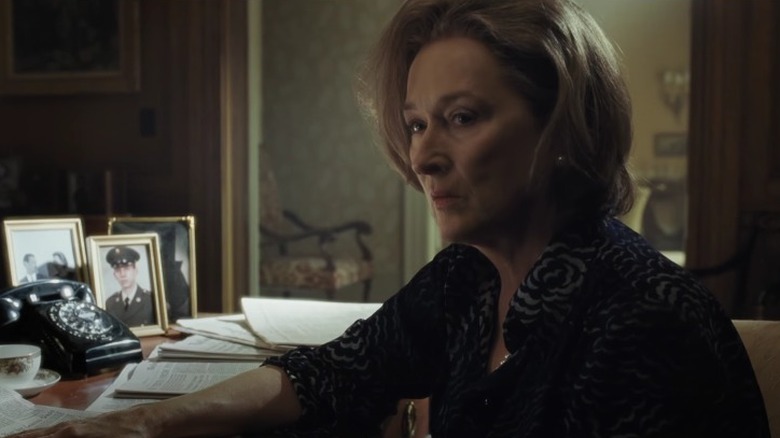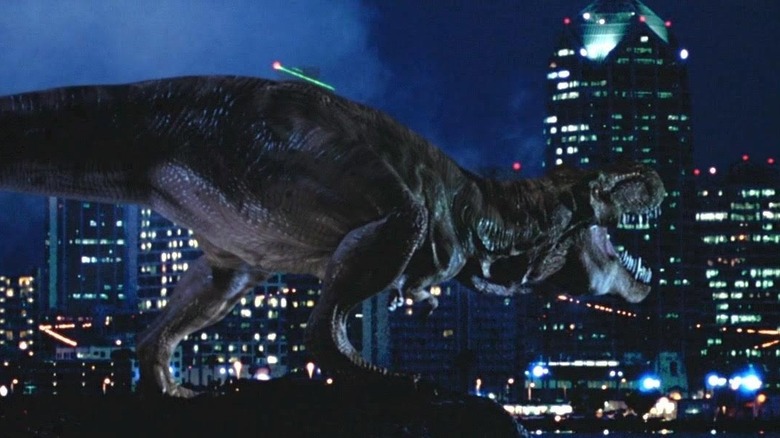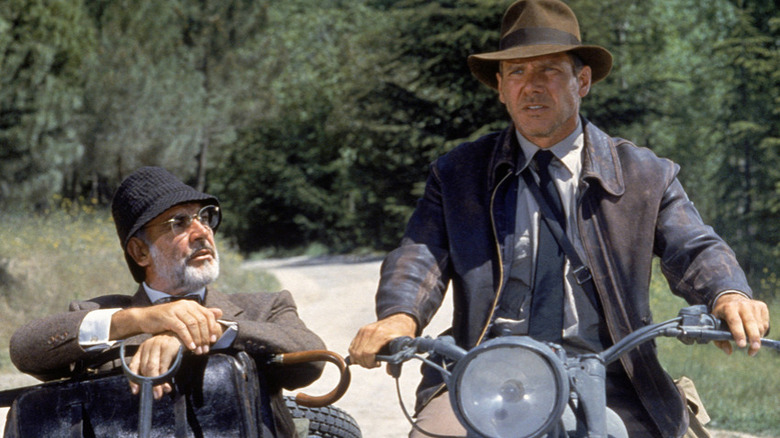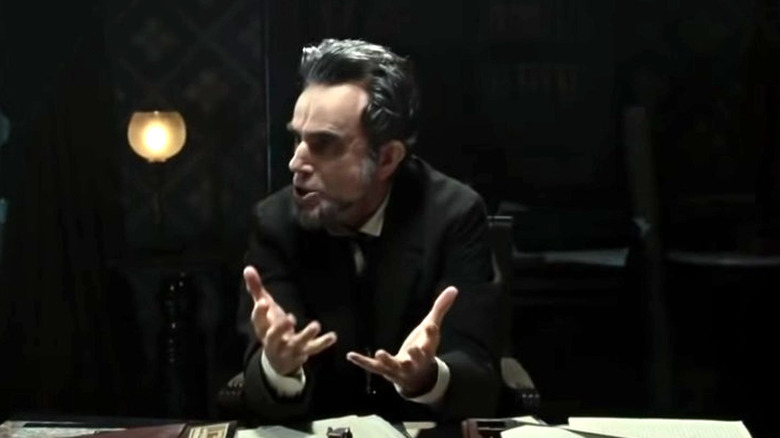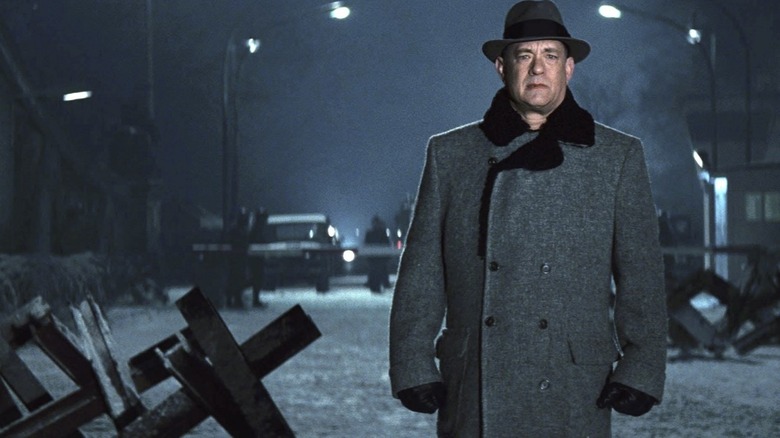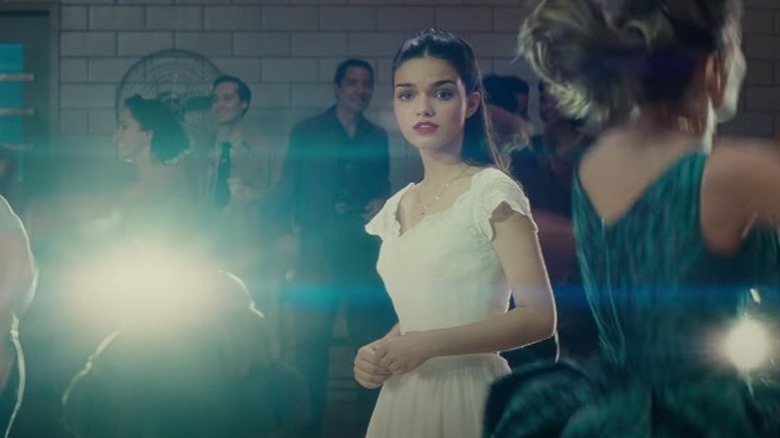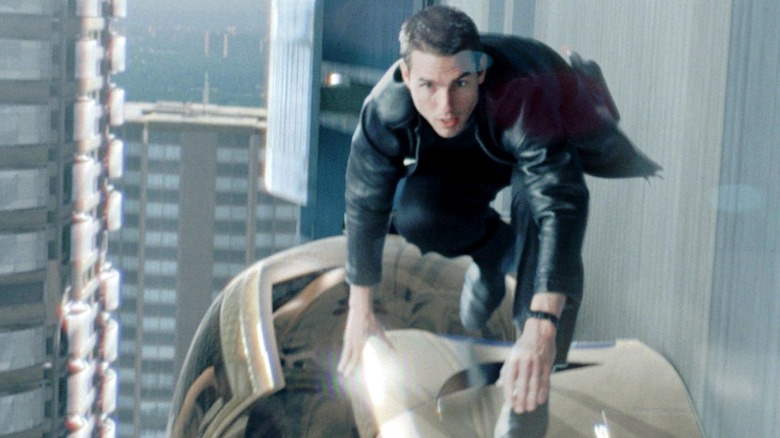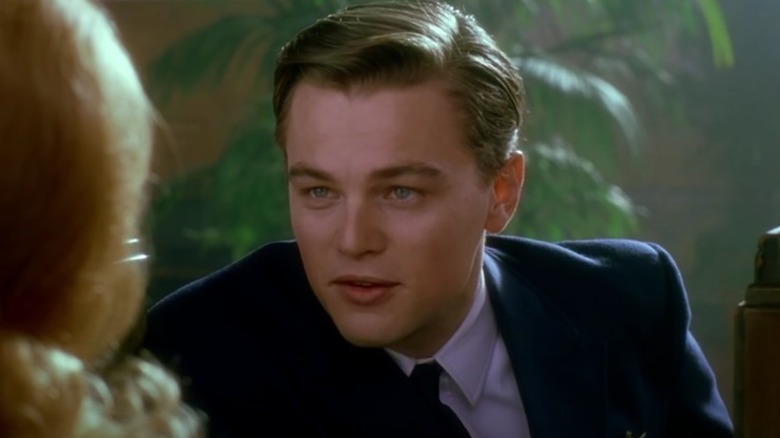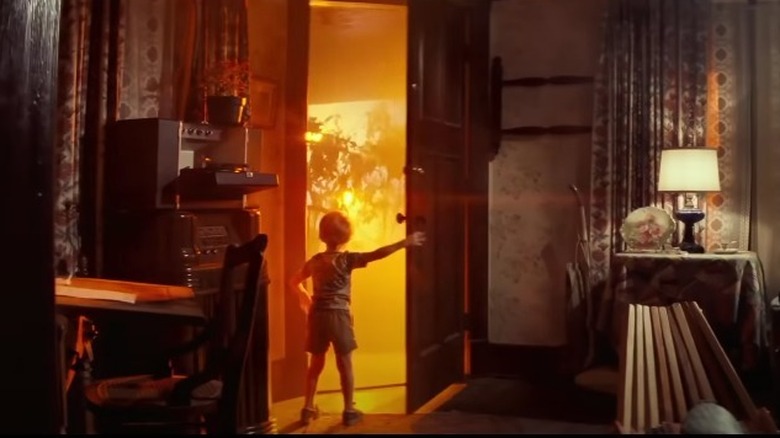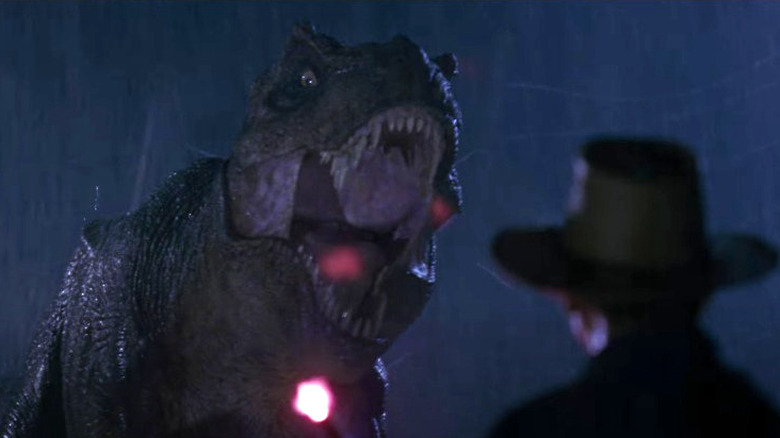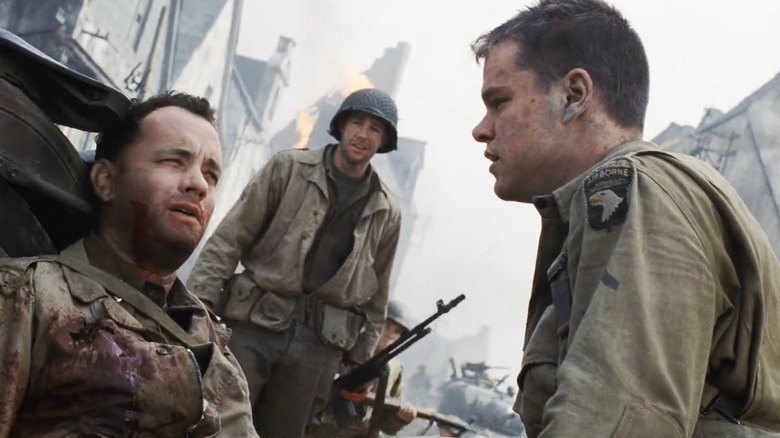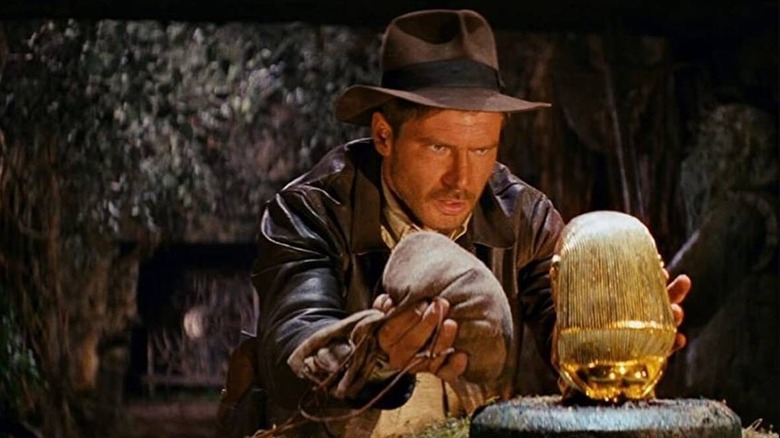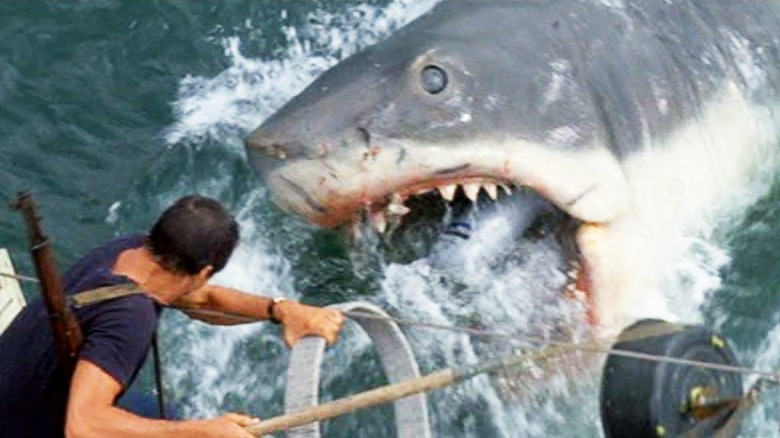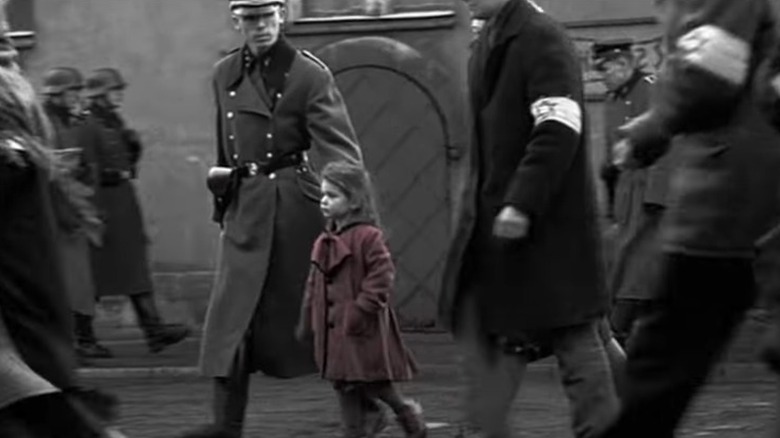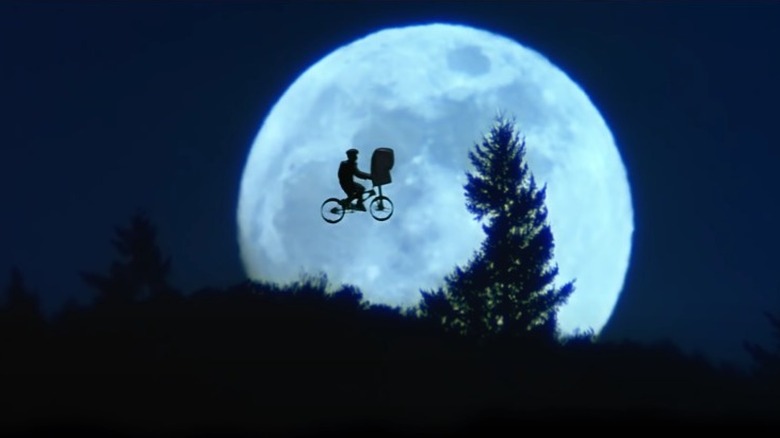Every Steven Spielberg Movie Ranked
For movie buffs who grew up in the '80s and '90s, Steven Spielberg's work was about more than just mere films. A giant mothership playing music in the desert; Indiana Jones stepping out of the shadows for the first time; E.T. and Elliott sailing across the moon; the eye of the tyrannosaurus revealed via flashlight: These images lived in the subconscious as fond memories, more like dreams than entertainment.
In 1970, Spielberg began working professionally as a director. With memorable episodes of Rod Serling's "Night Gallery," "Columbo," and the exciting and suspenseful television film "Duel," he proved his talent as a visual storyteller. But it wasn't until he made the leap to the big screen with 1974's "The Sugarland Express," that the world took notice of just how capable a craftsman he was.
Over the decades, he continued to hone his craft, shaping cinema for entire generations with work that was equal parts whimsical, enchanting, and visceral. Whether they're stories about children having to grow up too quickly, the horrors of war, or a giant with gas, his films never fail to be engaging at worst and transcendent at best. We've decided to take a look at his work and rank every feature-length, theatrically released film he's directed, from the merely good to the great.
32. 1941
Calling any Spielberg film bad is tricky. Even at their worst, they're at least interesting. In the case of his WWII screwball comedy, "1941," with its massive cast, bloated gags, and almost non-stop explosions, you spend much of the time wondering, "Why does this feel so wrong?"
If a Spielberg film doesn't grip you on an emotional level, you can usually appreciate the visuals themselves. With "1941," however, most of it is so dark and shrouded in a mysterious haze that it's difficult to process what you're looking at. Add the frenetic editing, really bad jokes, and utter lack of narrative focus, and you've got yourself a pretty annoying experience.
Yet there's still that lingering "what if" question in your mind. What if the editing were steadier and the scenes were brightened and the jokes were given time to actually land? Is there a good, funny movie there? Probably. There are certainly moments of comedy that work (like Robert Stack's Major General Stilwell being excited to see "Dumbo," and mouthing along with all the songs), but they exist in the margins of this relentlessly loud film, almost going unnoticed.
31. Indiana Jones and the Kingdom of the Crystal Skull
For a lot of "Indiana Jones" fans, it's pretty easy to criticize "Indiana Jones and the Kingdom of the Crystal Skull." It suffers from the same overindulgences of Spielberg's other disappointments, with confusing action scenes, rough comedy that never really lands, and bizarre creative design choices. However, it has enough bright spots and moments that capture the spirit of the original three films that you can forgive yourself for enjoying it.
Seeing an older Dr. Jones face off against the Russians makes sense given the time period. Bringing back Marion Ravenwood and revealing that she and Indy have a child is a nice way of acknowledging the passage of time and adding a new element to Jones' character. Even hunting for crystal skulls makes sense, considering he's always been interested in supernatural artifacts.
The problems lie with the details. Why is Mutt so annoying? Why aren't we given more time to see Indy trying to accept the fact that he's a father? Why on Earth would someone use a snake to climb out of quicksand? What's with all the goofy CGI and ancillary characters who only serve to complicate a story that should be as straightforward and simple as possible? We're not mad, we're just disappointed.
30. Hook
"Hook," the 1991 sequel to "Peter Pan," has all the stunning, light-hearted whimsy you'd expect from a Spielberg fairy tale, but it's surrounded by dull, uninteresting characters. Everything leading up to the kidnapping of Peter's children goes on for so long that by the time Peter arrives in Neverland, you've almost forgotten what the movie's about. While the vistas glimpsed in the flying scenes and from the home of the lost boys are spectacular, some of the sets look so fabricated that it feels like we're watching a play. That's not necessarily a problem (the original story began life as a play, after all), but it does feel incongruous with the rest of the film.
"Hook" isn't exactly a bad movie. It's at the very least entertaining, with glimpses of brilliance — it just doesn't all mesh. If some of the less interesting story elements were trimmed down, it would go a long way in making this a much stronger narrative experience than it is, but as a whole, it is a curiosity in Spielberg's filmography — a promising concept with an uneven, disappointing execution.
29. The Terminal
"The Terminal" is a sweet little romantic comedy sort of based on a true story about a man (Tom Hanks) forced to live in an airport after a coup is carried out in his country and he is unable to return home. Spielberg continuously finds ways to film such a limited space that keeps you engaged in what's happening, without the setting ever getting repetitive, and the plot moves at a nice pace.
As well made as the film is, it's just a little too generic. There aren't many glaring issues that take you out of the movie, but there's nothing that really pulls you in either. At no point do you ever feel that Viktor is in any real trouble or that his burgeoning relationship with Amelia (Catherine Zeta-Jones) is the stuff of great Hollywood romance.
By the time the movie's over, you won't be glued to your seat, floored by the experience. Nor will you be cheering or crying tears of joy. You'll probably just nod your head and say, "That was cute." It won't change your world, but it will keep you watching from beginning to end, which isn't nothing.
28. Always
On the surface, the 1989 film "Always" is everything an '80s Spielberg film should be. In a decade where he released "E.T. the Extra-Terrestrial" and the first three "Indiana Jones" films, this story about an aerial firefighter who dies and comes back as a ghost to help his girlfriend move on fits right in with the rest of his work, but fails to reach the same level of excellence.
When looking at his filmography, the late '80s and early '90s were clearly a transitional time for the director. Although he'd made the more grounded and serious films "The Color Purple" and "Empire of the Sun," he was still primarily known for his big, crowd-pleasing movies. With inspired aerial scenes and gorgeous landscapes, the movie looks like all his other fantasy films. Yet there are signs that he is trying to go deeper.
When Dreyfuss' character walks through the charred woods, he sees a deer. The moment is quiet and haunting. He then comes across a patch of unburned ground where Audrey Hepburn waits for him, dressed all in white. These scenes are surreal and symbolic of something, but they don't really work with the rest of the movie's sillier tone. Overall, the movie feels like little more than a really well-made episode of the anthology series "Amazing Stories" that Spielberg produced.
27. Ready Player One
Independent of its source material, "Ready Player One" is another enjoyable but misguided Spielberg adventure. In the years leading up to its release, Spielberg had been focusing primarily on historical dramas like "War Horse," "Lincoln," and "Bridge of Spies." "The BFG" had been aimed at a younger audience than he'd typically catered to, and "The Post" was a smaller movie than we'd seen from him in a while.
In a way, "Ready Player One" could be seen as a return to form for the director. It's huge, wild, and imaginative. Some action scenes hark back to his best work while pushing the visuals into completely new territory for him. There are things in this movie that work astonishingly well. The Oasis genuinely feels like a videogame world come to life, and some of the easter eggs and character cameos are very fun (the sudden emergence of the homicidal Chucky doll being a real standout), but none of it coalesces into anything greater than the sum of its parts. The villain is uninteresting, the mythology surrounding Halliday is tired, and the romance between Parzival and Art3mis has no spark. Still, the moments that work (like that first big race) are worth rewatching on their own.
26. The BFG
Although fantasy has been a big part of Spielberg's films, he rarely steps into that world completely. Usually, he tells stories that exist in a recognizable reality with one or two fantastical elements. One of the few times he committed to the realm of fantasy was "Hook," and the result was far from stellar. This is what makes "The BFG" so interesting.
Adapted from the Roald Dahl novel, "The BFG" tells the story of a little girl who is captured by a giant, and the two become fast friends. Plenty of his films can be appreciated, even loved, by very small children, but they tend to have more of a general family appeal. This, on the other hand, is firmly planted in the kids' film category.
That doesn't mean adults can't appreciate it: There's a lot to enjoy here. But some viewers might find themselves surprised by how goofy it gets. Where Spielberg almost seemed nervous to fully commit to the sillier side of "Hook," he dives headfirst here and the film, honestly, is better for it.
25. War of the Worlds (2005)
With "Close Encounters of the Third Kind" and "E.T. the Extra-Terrestrial," Steven Spielberg had presented a benevolent universe, one where the aliens have no interest in destruction. Instead, they want nothing more than to communicate. All that changed in 2005 when he released his giant and terrifying update of the classic H. G. Wells story, "War of the Worlds."
Instead of a quaint film about gentlemen scientists trying to figure out a way to battle invaders from another world, everything takes on a much grittier, more cynical tone in the wake of the September 11th terrorist attacks in the United States. Much of the imagery here, with clouds of dust, panic in the street, mass destruction, and bewilderment, evokes that real-life tragedy in an uncomfortable way.
This is a relentless film that takes your nerves to the edge, before finally letting up in the film's final narration. While it might seem convenient to destroy the aliens with bacteria, it ultimately serves to reaffirm what it means to be human.
24. War Horse
In "Close Encounters of the Third Kind," Steven Spielberg made us believe in UFOs. "Jurassic Park" made us believe we were seeing actual dinosaurs. "A.I." convinced us that a little robot boy was capable of love. The 2011 film "War Horse," based on the novel by Michael Morpurgo, made us believe that a horse could be soulmates with a human being.
It sounds silly, but it works. Joey, the eponymous war horse, is a fully-fledged character. He isn't simply an animal we care about because he's adorable: Joey has depth to him. We know when he is scared, playful, and angry, just as we know what Albie, the young man who imprints on him, is feeling at the same time.
Aside from the connection we feel with Joey, there is so much beauty in this film that it's practically overwhelming. Some of the landscapes look like fairy tales come to life, and you ache to just sit and observe them for hours on end. Additionally, while not nearly as stupefying as anything glimpsed in "Saving Private Ryan," there are battle scenes so impressive that they practically lift you off your feet. The sequence where Joey is trying to escape a tank is exhilarating and glorious, proof that after almost 40 years, Spielberg can still surprise and wow an audience.
23. The Adventures of Tintin
The real mystery surrounding "The Adventures of Tintin" is why people aren't talking about it more. It has all the thrill and excitement found in the best "Indiana Jones" movies, plus a script co-written by Joe Cornish ("Attack the Block"), Steven Moffat ("Doctor Who," "Sherlock") and Edgar Wright ("Shawn of the Dead," "Hot Fuzz."). The performances are strong across the board, with inventive motion capture technology.
So why haven't we seen an entire series of sequels? Critics and audiences seemed to like it. Peter Jackson has been linked to it for a very long time. Is it because Hergé and his work aren't very well known in the United States? That shouldn't matter: The film works with no knowledge of the source material.
One could argue that it has too many of the over-stuffed action scenes present in Spielberg's lesser works, but the fact that it's animated makes the whole production feel energetic rather than bloated. Is it his best adventure film? Not at all. But nor is it his worst — "The Adventures of Tintin" is a thrilling adventure that really deserves more eyes on it.
22. Empire of the Sun
In "Empire of the Sun," we start with a little English boy living in China with his wealthy family, dreaming of planes. He spends most of his time imagining what it would be like to fly them, and talking about them to anyone who will listen. These are the fantasies of a child without a care in the world.
Then the Japanese military invades. He is separated from his parents and finds himself in a world where his childish musings get him nowhere. No one wants to hear what he has to say, they just need him to do what he's told. As years pass and he finds a method of survival within an internment camp, a sense of normalcy returns. Until the war ends. Alone again, he wanders the countryside hoping to find his childhood again.
Prior to this film, Spielberg's career was built predominantly on blockbuster fantasy films, with the exception of "The Color Purple." Here is a very serious and adult film about the pain of losing our sense of innocence: It's a noticeable departure from his other work, almost as though he is experiencing a creative maturation process himself. That's a matter up for interpretation, though. What's beyond question is the power of the film, its incredible imagery, and the breathtaking lead performance from Christian Bale.
21. Amistad
"Amistad" offers horrific glimpses into the barbaric world of human trafficking. It does not shy away from the ugliness and disgusting treatment of human beings kidnapped to be sold as property. There are moments here more terrifying than any great white shark or invader from outer space. That alone should make it required viewing, to remind us of the scars of history that resonate to this day.
Just as important, however, is its stance that every life is its own story. Much of the film is about the frustration of two very different groups of people pulling their hair out, trying to communicate. When, at last, they are able to speak to each other and listen to those stories, the superficial differences begin to subside.
When you know someone's story, you know the person. When you know the person, it's harder to see them as cargo, and thus more difficult to deny their humanity. This is the enduring legacy of "Amistad."
20. A.I.: Artificial Intelligence
As with many of Spielberg's films, the story behind the making of "A.I.: Artificial Intelligence" is almost as interesting as the film itself. Unfortunately, much of the discourse surrounding its release was about the incongruity of vision between the late Stanley Kubrick and Steven Spielberg, leading to quotes like this from Peter Rainer in New York Magazine: "Temperamentally, Spielberg and Kubrick are such polar opposites that A.I. has the moment-to-moment effect of being completely at odds with itself."
It's a simple story: A futuristic retelling of "Pinocchio," with flashes of real cruelty and disturbing violence, that we are willing to stomach because of the optimism of this robot boy and his impossible dream of being human so his mother will love him again. David's journey grips you by the heart and pulls you through a terrifying and perverse world. The scenes of a flooded Manhattan are chilling and beautiful, as is David's response to learning he isn't special. Yet he, and his reluctant guide Gigolo Joe, are more unique than any human in the film because, despite everything they've experienced, they still believe in magic.
19. Munich
For anyone who has ever criticized Steven Spielberg for tacking on happy endings to films that don't deserve it: Give the bleak, brutal "Munich" a try. The story is about a group of men tasked with assassinating the orchestrators of Black September, an attack that resulted in the deaths of Israeli hostages at the summer Olympics in Munich.
Unlike other spy films that glorify the life of someone carrying out dangerous missions for their country, there is nothing fun, glamorous, or exciting about what these men have to do. Tense sequences punctuated by moments of harsh, visceral violence and gore create a sense of miserable reality. At no point do you root for these men, salivating over their next attack.
The narrative takes you into the psychology of the cycle of violence. By the time their mission is done, you feel just as empty and disillusioned as Eric Bana's character. You aren't given easy answers, or asked to pick a side. The film merely demonstrates how atrocious, repugnant, and truly lonely war and violence are.
18. The Sugarland Express
In retrospect, you can see glints of Spielberg's career sparkling all over his first theatrical feature film, "The Sugarland Express." There are moments of naturalism reminiscent of some of the crowd scenes in "Jaws," fascinating shot compositions that keep the confined space interesting, and glimpses of the breathtaking, desolate landscapes that he would showcase in "Close Encounters of the Third Kind."
Most surprising of all, however, is the comedy. Considering "1941" was released only five years later, it's hard to believe how funny this film is. While not a constant laugh riot, there are supporting characters who pop up throughout that illicit genuine belly laughs.
Of course, the core of the film is a young man and woman who just want to get their child back (inspired by an actual event), and the tragedy that comes from the futility of their attempt. You know there's no way this will end well for them (regardless of what the epilogue would have us believe), but you can't stop rooting for them.
17. Indiana Jones and the Temple of Doom
"Indiana Jones and the Temple of Doom" has a lot of problems, not the least of which is its cultural insensitivity. At times the film is much too silly, which contradicts the movie's dark tone. Willie Scott is a less interesting love interest than the iconic Marion Ravenwood: The unfortunately named Short Round can get a little taxing with his one-liners, but that's nothing compared to the constant shrieking and complaining from Willie.
It may be a deeply flawed film, but it's also a tense and enthralling adventure. While its predecessor "Raiders of the Lost Ark" has some grit, it's still relatively tame. The sequel "Indiana Jones and the Last Crusade" is exciting but lacks an element of real danger. "Temple of Doom," on the other hand, has danger in spades. Deep down, we know Indiana will make it — of course he will — but the movie does a really good job of almost convincing you that he's done for. While the leading man in a studio franchise can sometimes become more superhuman as their adventures go on, Indiana Jones is pushed to the brink of madness and barely makes it out alive, solidifying him as one of the greatest action heroes Hollywood has ever produced.
16. The Color Purple
"The Color Purple" is not a perfect movie. With its beautiful cinematography and surface-level treatment of predatory violence, even someone who isn't familiar with Alice Walker's novel can sense that something is missing: The subject matter is too real and primal to be this sanitized. Despite this, the film frequently overcomes its flaws.
From the astounding performances to Quincy Jones' incredible score, this is a movie that casts a spell on the viewer. The idealized look of the film, free of any grit, makes the subject matter more palatable. If the look and tone of the film matched the raw, horrifying nature of its narrative, it might have been unwatchable. While that would have been an admirable creative choice, Spielberg opts instead for accessibility. "The Color Purple" reminds us that although the world can be unfathomably cruel, and each life is full of gut-wrenching and soul-destroying tragedy, there is true beauty out there if you choose to see it.
15. The Post
Other than the opening sequence of the film, there isn't a single car chase, gunshot, or explosion in "The Post." It is made up primarily of people in stuffy rooms spitting jargon so quickly we barely have time to catch it all. Without all the traditional trappings of your usual thriller, "The Post" still manages to keep you glued to each and every scene. The entire film, every dialogue-heavy moment and discussion about law and corruption and business, all leads up to one of the more suspenseful moments in all of Spielberg's work: a phone conversation.
It's a cliche to point out a good Meryl Streep performance, but it is critical to acknowledge it here because that moment is all about her character. Until that point, she is playing a very intelligent and capable woman crippled by fear and doubt. We see she has what it takes to stand up and tell off these men who think they know better than her, but she isn't confident in herself.
Then the big moment happens. She has to decide, right then and there on the phone, if her newspaper will risk everything by publishing top-secret government documents detailing America's involvement in Vietnam. The camera catches every microexpression she has until, finally, she gives her answer. It might not be an adventure blockbuster, but it's nevertheless thrilling.
14. The Lost World: Jurassic Park
There's no good way to follow "Jurassic Park" — That was less a movie, more a paradigm shift in the history of filmmaking. You can't simply recreate the immense power of seeing a photorealistic dinosaur walk across the screen in broad daylight. There's no point in trying. However, when a film is that successful, you've got to make a sequel.
"The Lost World: Jurassic Park" doesn't have the same charm or awe-inspiring beauty as its predecessor. Nor are any of the characters nearly as interesting or involving. It's inferior to the original in just about every way, but that's because nothing can be "Jurassic Park." Instead of trying to capture lightning in a bottle a second time, it seems as though the decision was made to have as much fun as possible.
No more barricades: The dinosaurs roam freely. How do you fight velociraptors? With gymnastics, of course! And what happens when the dinosaurs get taken off the island and end up terrorizing San Diego? "The Lost World: Jurassic Park" isn't a great film — It isn't even a great sequel. But it's got plenty of the dinosaurs we fell in love with in "Jurassic Park," and that's enough.
13. Indiana Jones and the Last Crusade
Even though there are four movies starring Indiana Jones and a fifth film on the way, "Indiana Jones and the Last Crusade" is still the best ending to the franchise we could have asked for. While the first two entries were light on details regarding Indy's past, the third film is all about how he grew up, and shows him reconciling with a father who never understood how to show his son love.
For Professor Henry Jones, life was all about work. Family, and everything else, came second. It's no surprise that his son grew up to be just like him. Indiana Jones doesn't have a steady love in his life and, as far as he knows, no children. While the series could have easily brushed over that and we all would've happily accepted Indy as a thrill-seeking bachelor, the decision to explore his relationship with his father adds new layers to the character.
Although "Last Crusade" has some excellent stunts and a captivating finale, it's Harrison Ford's chemistry with Sean Connery that makes the film soar. These two work off each other like actual family and the interplay is absolutely delightful. If we had never seen another Indiana Jones adventure, the experience of watching him reconnect with his father and ride off into the sunset would've been a lovely conclusion.
12. Lincoln
"Lincoln" is a well-crafted piece of entertainment inspired by actual events designed to tell an engaging narrative. The film is not meant to educate the audience on every historical detail and fact that one could find in a number of history books. This is not the real Abraham Lincoln, it is a character inspired by the man. Did he really struggle to keep his family and country together simultaneously? Was he truly so altruistic regarding slavery? Those questions are meant to be answered by historians, not Steven Spielberg.
His job was to create a world that mirrors reality in order to suit the purposes of his narrative, and he has accomplished this task admirably. This is a film made of incredible performances and art design. The sets and costumes look amazing and the actors inhabiting it convince us of that reality in order to weave a fascinating story, rather than to show us the truth. It isn't a masterpiece, but it is a stunning achievement.
11. Bridge of Spies
One of the greatest gifts Steven Spielberg has given to American movie audiences during his later career has been actor Mark Rylance. Of course, he had been a working actor prior to "Bridge of Spies," but he wasn't center stage in many Hollywood productions. Since appearing in this 2015 film, he has gone on to work with Mr. Spielberg three times, and each performance is riveting.
He is so natural, understated, and hesitant in his delivery that you can't help but buy him in his role. The entire opening sequence to "Bridge of Spies" is dedicated, essentially, to his face and his movements, and it brings you right into the world Spielberg has created. It goes a long way in selling the paranoia of the time, because we're never quite sure if we trust his character.
But we want to, just as Tom Hanks' character wants to trust in the rule of law, but is constantly being confronted with reasons to give up. Every scene offers the possibility of an unexpected twist, keeping us rapt in attention, expecting everything to go south at any minute. This is thanks in part to a great script by Matt Charman and the Coen Brothers, but also to the strength of the actors and the skills of Spielberg.
10. West Side Story (2021)
Like "Romeo and Juliet," the musical "West Side Story" (which is ostensibly a retelling of the classic play) is not a love story. It is a tragedy. Just as Juliet and Romeo were victims of a feud between their families, Tony and Maria suffer because of a raging battle between their communities over territory.
In Spielberg's hands, the tensions between the Jets and the Sharks are clearer and harsher than ever. Despite the singing and dancing, there is palpable hatred between the two gangs. Yes, it is still a little goofy to see street-smart fighters express themselves through song, but when the music fades away, all you have are two groups of very angry and disillusioned men visibly itching to murder each other.
When the rumble finally goes down and the dancing is done, things are quiet, cold, and suspenseful. Even if you know the story, what happens during that fight leaps out at you: It hurts. As brilliant and moving and tragic as Robert Wise's 1961 film is, it never feels quite as ferocious and cold as Spielberg's take.
9. Minority Report
"Minority Report," released in 2002, solidifies a change that started with the release of "A.I.: Artificial Intelligence" the year before. When looking over most of the films Spielberg directed in the preceding decades, there is a warmth to the way they were lit and their use of color, something that would change in the 21st century.
There are scenes in "Minority Report" where natural light seems to be exploding through the camera lens, while the rest of the world feels cold and stark. As fun and interesting as the film is, there's a detachment to the storytelling that feels alien to Spielberg's work. The structure of the film is just about as traditional as you can get, but the filmmaking feels fresh, innovative, even borderline experimental.
"Minority Report" is a dark film with a harsh outlook on humanity and the sacrifices we are willing to make in the name of safety. From here on out, Spielberg movies don't feel quite as warm and inviting as they used to.
8. Catch Me if You Can
Another film with a traditional narrative structure but a new film style was "Catch Me If You Can," based on the true story of Frank Abagnale Jr. On paper, there are two ways to handle this material. Either do a sleazy tell-all film that either glorifies or ridicules this con man, or take an academic look at his psyche and what would cause someone to live such a criminal vagabond lifestyle.
Spielberg does neither and both at the same time. There are moments where one may find themselves envious of Frank's confidence. Then there are times when you pity him and how alone he is. Essentially, what Spielberg has done is treat the man like a larger-than-life character, and he tells an appropriately old-fashioned, larger-than-life story about him. The result is a curious experience that brings you in but keeps you on your toes, wondering exactly where the story will take you next.
7. Close Encounters of the Third Kind
The fact that "Close Encounters of the Third Kind" is only Steven Spielberg's third major motion picture is astonishing. If "The Sugarland Express" showed the kind of potential that would be fulfilled with "Jaws," then "Close Encounters" was the ultimate culmination of that promise. Emotionally rich and textured, with truly stunning images that continue to inspire wonder almost five decades later, this is the film that showed the world Steven Spielberg had truly arrived.
The world of the movie is recognizable, making the alien presence all the more spellbinding and incredible. Rewatch the scene where the little boy is delighted by lights in the sky. That could be any house in any countryside, real people living lives that we can identify with. So when those clouds roll in, we grip our seats with anticipation.
In addition to being a visual powerhouse, it's also a tragic story about obsession and the decay of a family. The more Richard Dreyfuss commits himself to this quest of understanding what's going on, the more his family falls apart. This kind of authentic family drama feels so unexpected and real that when juxtaposed against traditional science fiction, it hits you on a primal level.
6. Jurassic Park
"Jurassic Park" may not be the most intellectual movie in the world. Maybe its characters aren't all that complicated. Perhaps the ethical questions it asks aren't explored to their fullest potential. However, none of that really matters. Let's not forget that movies are illusions, magic tricks intended to allow the audience to escape and potentially show them something they've never seen before. Well, "Jurassic Park" accomplishes this in spades.
The dinosaurs in this movie are not scientifically accurate, but they feel real. They look and move so realistically that not even the advanced technology of the sequels is able to make us believe in their existence so fully. The danger they pose is palpable, and we buy into it without question. The experience of seeing them for the first time is so emotional that we forget the film's faults. All we care about is the fact that we are witnessing the impossible.
5. Saving Private Ryan
The opening sequence of "Saving Private Ryan" is still talked about, for good reason. Beyond the copious amount of gore and shocking violence, the scene is disorienting and terrifying in a way that transports us to that beach and dares us to survive. This isn't a movie designed to glorify the sacrifice of WWII soldiers with the likes of John Wayne rousing his troops to fight: It is a disturbing, visceral experience depicting the horror and futility of war.
Nothing else in the film really lives up to that opening, but that doesn't mean the rest of it falls flat. There are numerous sequences of tension and ugliness that sear themselves into your brain. Like "Jurassic Park" (an understandably dubious comparison, of course), "Saving Private Ryan" doesn't aspire to dazzle you with its original characters and intricate plot. This movie transcends such conventions by making you believe that everything on screen is totally real, finding truth in the artifice.
4. Raiders of the Lost Ark
When we get to the top films on the list, there's little left to say: Everyone knows and accepts their status as genuine movie classics. We can nitpick about plot holes and story inconsistencies, but none of that diminishes the impact each and every one of these films has had on movie audiences for decades.
Can we question how Indiana managed to ride the outside of a submarine safely? Is it fair to point out the fact that Indiana Jones doesn't succeed in his plan to stop the Nazis from getting the ark, and that the ending would have happened the exact same way even if he hadn't been there? Sure. But what's the point?
None of these things detract from the joy we experience when seeing Indiana Jones outrun a boulder, or stop us from marveling at his enduring courage in the face of seemingly insurmountable odds. And it certainly doesn't rob us of the pure fun we have watching this movie. "Raiders of the Lost Ark" is a classic because it gives us everything we could ever want: excitement, suspense, romance, and humor.
3. Jaws
Perhaps the ultimate example of the story behind the scenes being just as interesting as the one on-screen, "Jaws" is a bigger and better movie than it has any right to be.
The reason for this is that the plot isn't particularly special. A big shark kills some people and they decide to kill it back. That's the plot of "Jaws." Even the subplot about a mayor downplaying the threat in a desperate bid to keep the beaches open isn't unique. Any hired gun director could've handed in a serviceable, if unremarkable, film based on that premise.
It's not about the plot or the shark. The enduring power of "Jaws" is the filmmaking, the realism that sells the fantasy. The island is populated with believable characters. Brody feels like a good, genuine man who legitimately wants to help people and protect his family. The ocean itself is a looming danger, made worse by the suggestion of such a predator existing within it.
All of that works because an immensely talented director had a vision and surrounded himself with the best talent around to bring it to life. It is a masterfully crafted work of art that is legitimately frightening, suspenseful, and human. That is why we're still talking about "Jaws" all these years later.
2. Schindler's List
It is impossible to overstate the importance of "Schindler's List," just as it is impossible to overstate the horror of the Holocaust itself. Artistic representations of actual events can sometimes be truer than fact because they force us to empathize in a way that sanitized reports often fail to.
Sometimes the academic and factual approach simply doesn't penetrate the human psyche the way a Hollywood narrative can.
"Schindler's List," like "Lincoln," is not a documentary. It isn't meant to be a true account of who Oskar Schindler really was. It's a way to demand an audience's attention, and it serves as a gateway into a difficult subject. Through this fictionalized version of what Schindler did, we get to the truth of the cruelty, savagery, and inhumanity of the Holocaust. It allows general audiences to begin to grasp just how monstrous human beings can be to one another and serves as a warning not to ignore and dismiss what is still happening today.
1. E.T. The Extra-Terrestrial
Imagine it: In the summer of 1982, you enter a theater. The lights dim. The screen comes to life. You see an alien child separated from its mother, and as this little boy navigates the woods of a planet he knows nothing about, all the stresses of the outside world fall away. The only thing that matters is what happens to this stranded and helpless stranger.
The screen becomes a doorway into a recognizable suburban world, one with kids who remind us of ourselves or our friends. We connect with Elliott and E.T., as emotionally linked to them as they are to each other. We experience their hope, their love, their understanding. Enchanting music mimics our own heartbeats as danger in the form of nameless men with guns closes in. All seems lost. We will never get our friend home. Then we fly.
That is the power of movies. For a few hours, you are somewhere else, someone else. Very few films are capable of taking us away like that and returning us home, safely, securely, and changed forever. "E.T. the Extra-Terrestrial" is one of those movies, and every time you see it, it picks you up and allows you to soar.
